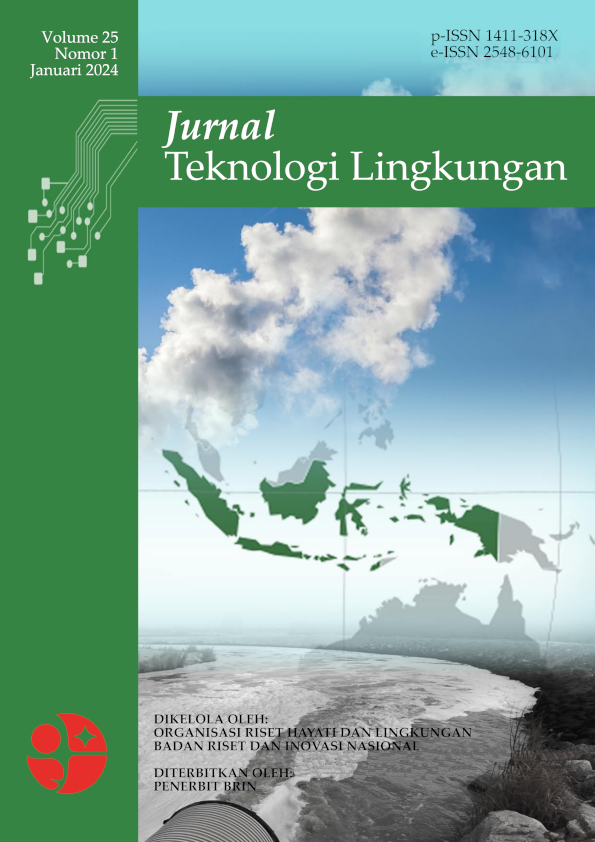Potential of Woody Biomass from River Debris for Thermal Process Fuel
Main Article Content
Abstract
Sampah perairan di Tempat Penampungan Sementara (TPS) Jakarta memberikan beban polusi yang signifikan akibat aktivitas manusia. Pemulihan energi menyajikan peluang untuk mendapatkan nilai dari puing-puing ini dan mencapai solusi limbah nol. Di antara komponen limbah di TPS Perintis, puing kayu dari puing-puing sungai di Jakarta mendominasi. Penelitian ini bertujuan untuk memproses puing kayu melalui proses termal di TPS Perintis. Penelitian ini menggunakan analisis hitungan beban di TPS Perintis dan melakukan pengujian laboratorium, termasuk analisis kadar air, analisis kadar abu, penentuan nilai kalor, dan thermal gravimetric analysis (TGA). Generasi harian sampah perairan di TPS Perintis rata-rata mencapai 716,4 m3/hari atau 5,2 ton/hari, dengan puing kayu menyumbang 62,8% dari total. Puing kayu menunjukkan potensi pemulihan energi tertinggi di antara komponen limbah, dengan nilai kalor sebesar 16,43 kWh/kg atau 54.123,38 kWh/hari. Hasil uji TGA menunjukkan bahwa puing kayu dapat digunakan sebagai arang, dengan dekomposisi terjadi pada rentang suhu 200–500°C dan hasil sisa sebesar 14%. Temuan ini menyoroti kelayakan pemulihan energi dari puing kayu di TPS Perintis dan potensi untuk mengubahnya menjadi arang. Kesimpulan penelitian ini menekankan pentingnya penggunaan proses termal dalam mengelola puing-puing sungai, menyediakan solusi berkelanjutan untuk pengelolaan limbah dan pelestarian lingkungan.
Abstract
River debris at the Waste Temporary Shelter (TPS) Perintis Jakarta poses a significant pollution load resulting from human activities. Energy recovery presents an opportunity to derive value from this debris and achieve a zero-waste solution. Among the waste components at TPS Perintis, wood debris from river debris in Jakarta is predominant. This study aimed to process the wood debris through a thermal process at TPS Perintis. The research employed load count analysis at TPS Perintis and conducted laboratory testing, including moisture content analysis, ash content analysis, calorific value determination, and thermal gravimetric analysis (TGA). The daily generation of river debris at TPS Perintis averaged 7.164 m3/day or 5.2 tons/day, with wood debris accounting for 62.8% of the total. Wood debris exhibited the highest potential for energy recovery among the waste components, with a calorific value of 16.43 kWh/kg or 54,123.38 kWh/day. The TGA test results indicated that wood debris could be utilized as charcoal, with decomposition occurring within the temperature range of 200–500°C and a residue yield of 14%. These findings highlight the feasibility of energy recovery from wood debris at TPS Perintis and the potential for its conversion into charcoal. The study's conclusions emphasize the significance of utilizing thermal processes for managing river debris, providing a sustainable solution for waste management and environmental conservation.
Article Details

This work is licensed under a Creative Commons Attribution-ShareAlike 4.0 International License.

